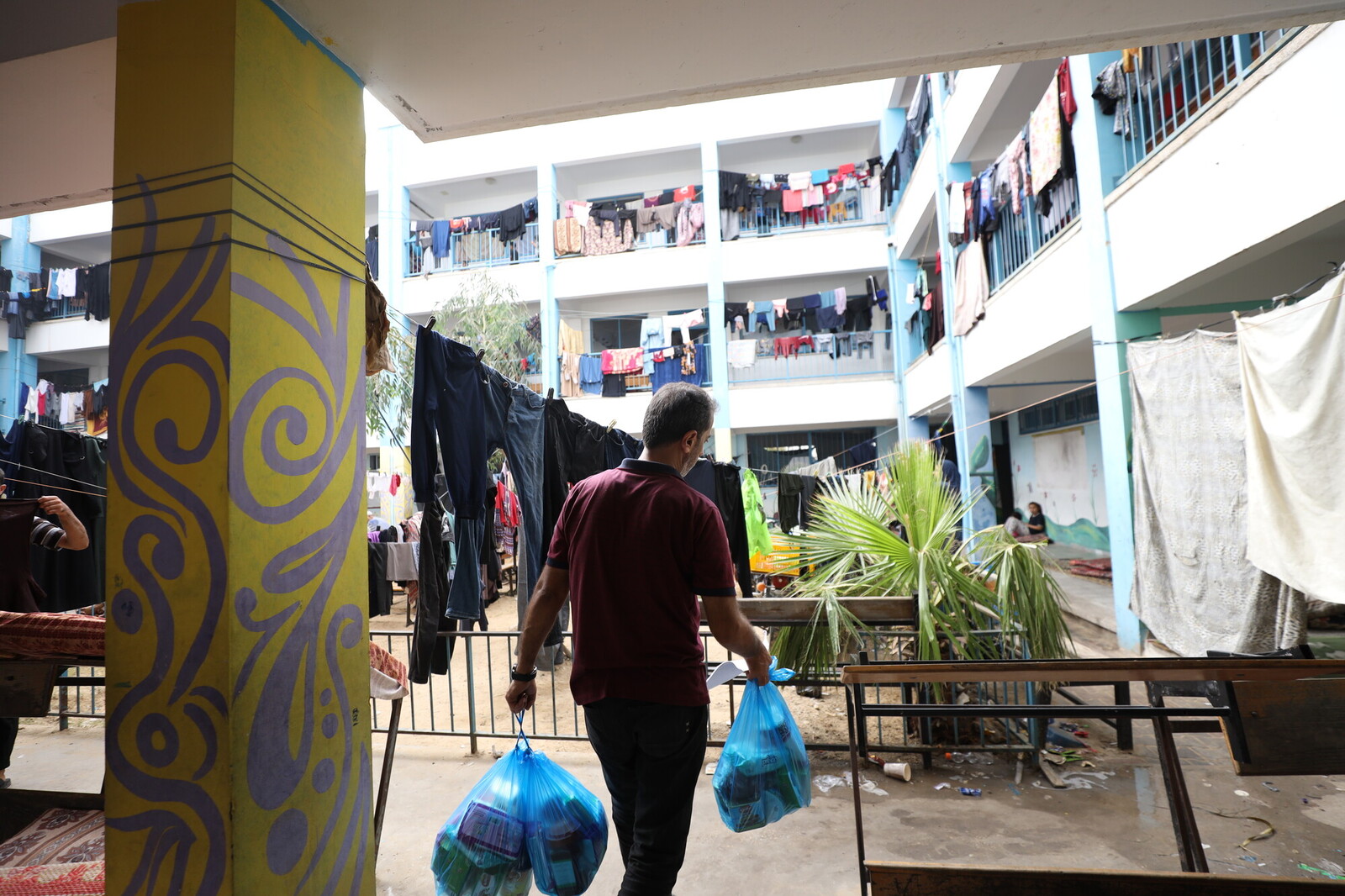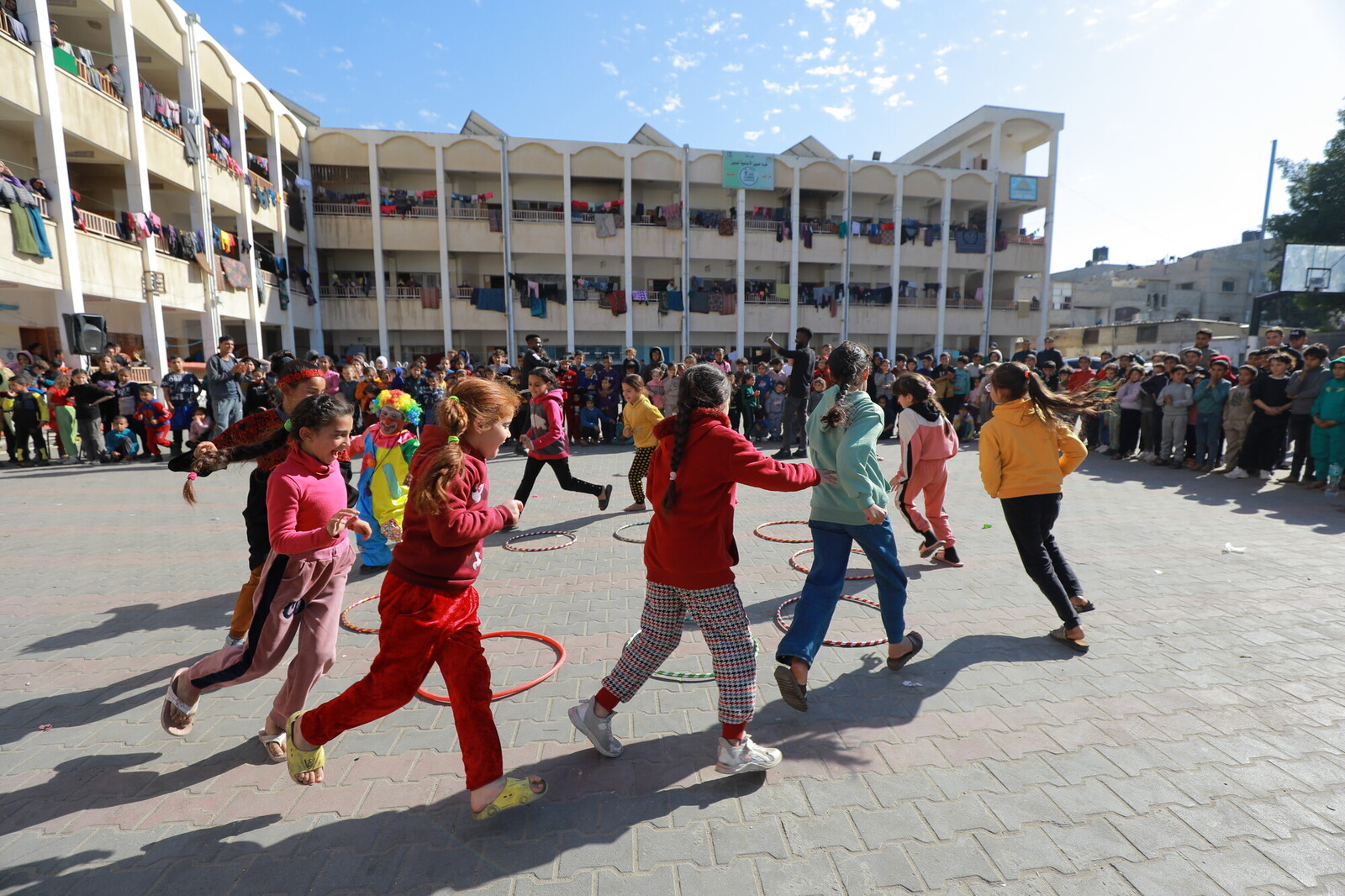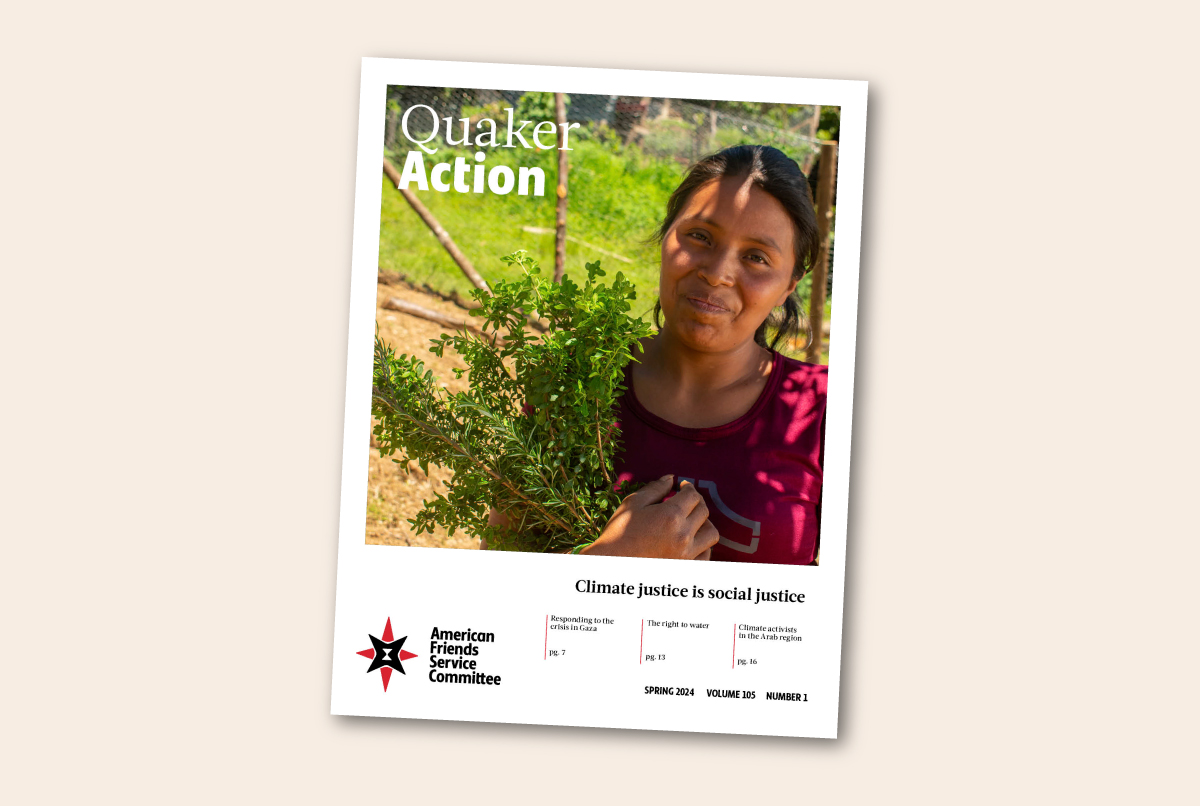
AFSC staff member Firas Ramlawi distributes bags of food at a former school that now serves as a shelter in Rafah. Photo: Amjad Fayomi
As of this writing, Israeli attacks on Gaza have killed tens of thousands of Palestinians. Nearly all of Gaza’s population has been forcibly displaced by Israeli actions that the International Court of Justice ruled may constitute genocide.
Israel's attacks on Gaza began after a Hamas attack that killed at least 1,200 Israelis, injured thousands more, and took an estimated 240 hostages. Thousands of Palestinians have also been taken captive by Israel.
AFSC mourns all who have been killed and calls for the peaceful release of all civilians held captive. As we have throughout our history, we stand in opposition to violence in all its forms.
Military responses have brought untold suffering and made the entire region less secure. Most protected areas and declared “safe zones” by the Israeli army—residential homes, schools, shelters, and hospitals—have been damaged or destroyed. AFSC’s own Gaza office, which was a declared international safe space, was destroyed on the second day of Israeli bombing. Fortunately, our staff are alive, though all are mourning the deaths of numerous relatives and the destruction of their homes. They have also been forcibly displaced multiple times. Without access to clean water, food, shelter, health and emergency services, the people of Gaza face more death because of starvation and disease.
AFSC has worked in Palestine and Israel since 1948, delivering humanitarian assistance to Palestinian refugees and working to build conditions for peace. Together with the AFSC community, we have mobilized in vital ways in recent months—to deliver humanitarian aid and to push for U.S. policies that support lasting peace.
Providing Humanitarian Relief in Gaza and the West Bank

Children enjoying recreational activities organized by AFSC and partners. Photos: AFSC/Gaza
Amid this escalating crisis, thousands of people have generously responded to our appeals for donations. As of March 29, these funds have enabled us to deliver emergency relief to more than 400,370 people.
Our team has delivered drinking water, food parcels, meals, and hygiene kits to Palestinians living in tents, shelters, and on the streets. These efforts were made even more difficult as Israeli authorities tightly controlled all humanitarian aid entering Gaza. They have delayed deliveries by weeks and even months—restricting aid to only a fraction of what is required to meet the massive need.
Our staff in Gaza have coordinated closely with local, regional, and international partners to locate and deliver aid, primarily in Khan Younis, Deir El-Balah, and Rafah areas in the south of Gaza. They made extraordinary efforts to adapt to changing circumstances and help those most in need—despite having lost loved ones and being displaced themselves.
Beginning in January, AFSC and partners began serving hot meals from open-air kitchens to people sleeping outside of shelters, reaching about 2,000 people a day. We also worked with partners to host recreational activities to help thousands of children living through the war. In the West Bank, we assisted 192 Gazan patients who were forced to relocate, providing them with assistance for their medical needs, hot meals, and winter clothing and blankets.
We are also looking to the months and years ahead, preparing to support displaced people in meeting essential needs, healing from the traumas of war, and rebuilding their lives.
“The dire humanitarian situation in Gaza is unprecedented,” says Serena Awad, program officer in Gaza. “Bombs, cold, and hunger are in every corner of the city. Our everyday has become only about survival. Being part of AFSC’s team working on the ground, next to and with our people, gives me—and them—so much hope. We’re grateful for the unwavering support of the AFSC community in making our efforts possible.”
SERENA AWAD, PROGRAM OFFICER IN GAZA"Our everyday has become only about survival. Being part of AFSC’s team working on the ground, next to and with our people, gives me—and them—so much hope.”
Exposing War Profiteers
Based on our Quaker beliefs, AFSC supports a full arms embargo on all parties in the conflict. Palestinian militant groups are already sanctioned. However, the U.S. government has transferred massive amounts of weapons to Israel since Oct. 7.
Within just the first month and a half, Israel received more than 15,000 bombs and 50,000 artillery shells, made by Boeing, General Dynamics, and other weapon manufacturers. These transfers were deliberately shrouded in secrecy to avoid public scrutiny and prevent Congress from exercising any meaningful oversight. AFSC has been tracking companies supplying these weapons. In December, we published a list of dozens that have benefited from human suffering and gross human rights violations.
“The scale of destruction and war crimes in Gaza would not be possible without massive weapon transfers from the U.S.,” says Noam Perry, strategic research coordinator for AFSC’s Action Center for Corporate Accountability. “As global resistance to war and apartheid grows, itis important that the public know exactly who is making this violence possible.
Organizing and Advocating in the U.S.
To end this complicity, many people across the U.S. have been mobilizing with AFSC to call on Congress to demand a cease-fire and humanitarian access for Gaza. In late October, AFSC began hosting an online action hour every Friday. More than 3,600 people have registered to receive up-to-date information and tips for their advocacy. Participants have joined in writing and calling their elected officials, attending town halls, and sending letters to the editor. They also joined a national day of action, protests, and more.
Collectively, we have sent more than 200,000 letters to our representatives and senators.
“We are grateful to everyone who has stepped up to support Palestinians in this crisis,” says Jennifer Bing, director of AFSC’s U.S.-based Palestine Activism Program.
